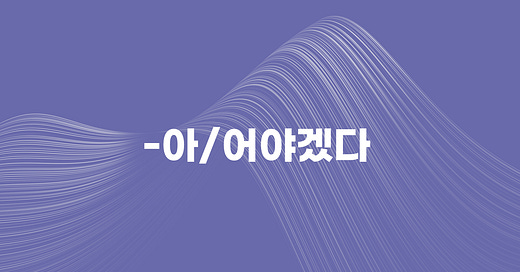Let's study the Korean grammar "-아/어야겠다" today. This structure is used to express a strong determination or intention to do something, or to indicate that something needs to be done due to a sense of obligation or necessity.
"-아/어야겠다" is indeed a combination of "-아/어야 하다" and "-겠-". These two grammatical structures come together to create a unique meaning and nuance. Let's break down how each component functions:
Analysis: "-아/어야 하다" + "-겠-"
1. "-아/어야 하다" (Necessity, Obligation)
"-아/어야 하다" indicates that there is a necessity or obligation to do something.
Example: "내일 일찍 일어나야 해요."
(I have to wake up early tomorrow.)
2. "-겠-" (Intention, Determination, Future Tense)
"-겠-" is typically used to express intention, determination, or a future assumption.
Example: "저는 이제 공부하겠어요."
(I will study now / I have decided to study now.)
Definition:
"-아/어야겠다" is a sentence ending used to express that the speaker has realized that a certain action needs to be done or that they have made a firm decision to do something. It often implies a sense of resolution, necessity, or urgency.
Usage:
To express a strong intention or decision:
It shows that the speaker has made up their mind to do something after considering the situation.
To indicate a sense of necessity or obligation:
It is used when the speaker feels that a certain action is required or necessary.
Conjugation:
If the verb stem ends in ㅏ or ㅗ, use "-아야겠다".
e.g., 가다 (to go) → 가야겠다
For all other vowels, use "-어야겠다".
e.g., 먹다 (to eat) → 먹어야겠다
If the verb stem ends in 하, use "-해야겠다".
e.g., 공부하다 (to study) → 공부해야겠다
Examples:
Strong Determination:
"내일부터 운동을 해야겠다."
(I’ve decided that I should start exercising from tomorrow.)"이번 주말에 책을 다 읽어야겠다."
(I need to finish reading the book this weekend.)
Sense of Obligation:
"돈을 아껴 써야겠다."
(I need to save money.)"지금 바로 병원에 가야겠다."
(I think I should go to the hospital right now.)"이제 그만 가야겠다."
(I’d better get going now.)
Realization of Necessity:
"벌써 12시네! 이제 자야겠다."
(It's already midnight! I need to go to sleep.)"비가 올 것 같아. 우산을 가져가야겠다."
(It looks like it’s going to rain. I should take an umbrella.)
Similar Grammar Structures:
"-아/어야 되다":
Indicates necessity but is more objective, without the sense of decision or intention.
Example:
"숙제를 해야 돼요." (I have to do my homework.)
"-겠어요":
Used to express future intentions or assumptions but without the strong sense of obligation.
Example:
"내일 일찍 일어나겠어요." (I will wake up early tomorrow.)
Things to Note:
"-아/어야겠다" often carries a nuance of spontaneity, as if the speaker has just come to the realization that they need to take action.
It is typically used in the first person since it’s related to the speaker's own decisions or realizations.
Be mindful of the context as it can sound like a command if used with others.



